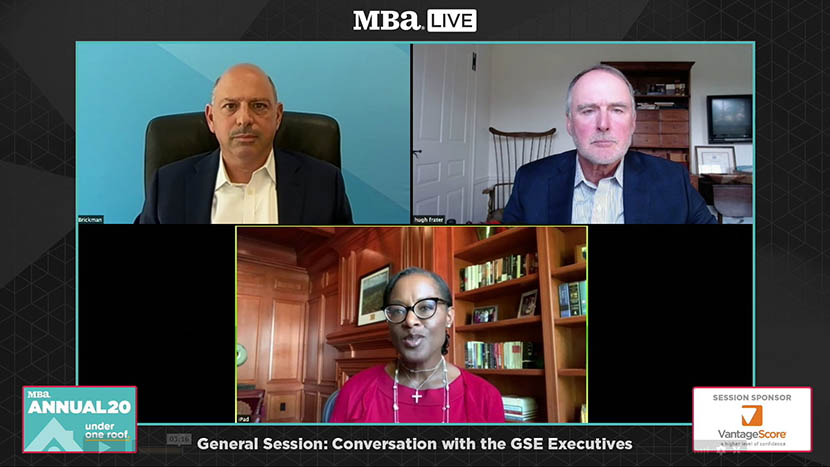
GSE Executives Discuss Pandemic Response, Defend New Refinance Fee

(Clockwise, l-r: Freddie Mac CEO David Brickman; Fannie Mae CEO Hugh Frater; MBA Chair-Elect Kristy Fercho.)
The government-sponsored enterprises have supported and provided critical liquidity to the market throughout the COVID-19 pandemic, Fannie Mae and Freddie Mac executives said.
Speaking at the Mortgage Bankers Association’s MBA Live Annual Convention & Expo, Freddie Mac CEO David Brickman and Fannie Mae CEO Hugh Frater said the housing market is doing well, in part based on the GSEs’ ability to provide liquidity.
Brickman noted one “silver lining” to the pandemic: “[It gave us] the opportunity to push forward on transformations in terms of alternative ways we can do business and reduce the frictions involved in closing a loan.”
Frater listed his three biggest “takeaways” from the pandemic. “The most important thing is putting people first,” he said. “Remember the human element. Lean into all COVID challenges. Within Fannie Mae, we take a people-first approach.”
Second, Frater noted the importance of speed and agility. “We’ve adapted tools to meet the needs of the current crisis,” he said. “The competencies we developed during this crisis will allow us to serve customers even more going forward.”
Frater’s last takeaway involved Fannie Mae’s collaboration with Freddie Mac and the Federal Housing Finance Agency. “Many decisions needed to be made quickly, and the only way to do that is to have solid relationships with Freddie Mac and with our regulator, FHFA,” he said. “Together, we put more than one million borrowers in forbearance.”
The pandemic accelerated several trends, including the disparity between the haves and the have-nots, Frater noted. “The long-term problem of affordable housing remains,” he said. “The barriers to creating new supply are complex. Fannie Mae focuses on areas where we can make a difference. For example, we are focusing on more manufactured housing–manufactured housing is currently about 6 percent of the housing stock. And our affordable multifamily business is as strong as ever.”
Fannie Mae also convened stakeholders to better understand the problem, said Frater. “We want to be part of solutions,” he said.
Brickman said the current crisis was “almost perfectly calibrated” to hit those most in need. “In terms of supply, we focus on ways to lower the cost of building and preserving housing and to lower construction costs,” he said. “We try to find ways to incent private firms to invest more in housing. We’re going to have to work hard on all these fronts.”
Brickman noted several Freddie Mac affordable housing accomplishments. “On the multifamily side, there is our Targeted Affordable Housing business, our Social Impact bonds, our investment in Low-Income Housing Tax Credits that we restarted a couple years ago. On the single-family side, we expanded the Home Possible program. We’re also looking at manufactured housing, factory-built housing and the affordable dwelling unit program,” he said.
Frater and Brickman defended the planned 50 basis point “adverse market” refinance fee, scheduled to take effect on December 1. “It’s not a popular decision among MBA members and others in the industry,” said 2021 MBA Chairman-Elect Kristy Fercho, Executive Vice President & Head of Home Lending with Wells Fargo.
“As you know, safety and soundness is one, two and three,” Frater said. “For us to play our role in all markets, both good and bad and large and small, we have to do it safely and soundly with long-term risk management in mind. That’s the rationale for this change. The GSEs are shouldering significant risks associated with the pandemic. As the principal risk-taker, we have to price that risk appropriately.”
Frater said the GSEs have sought to help servicers with extra volume and new flexibilities to manage through the crisis. “We are fulfilling our mission, but it’s not over,” he said. “Many millions of borrowers are still under stress. We’re required by law to be compensated for these risks and these costs.”
The fee should not materially affect anyone’s ability to refinance, Frater said. “The bottom line is, there is never a good time to raise prices, but when it’s the right time you have to do it,” he said.
